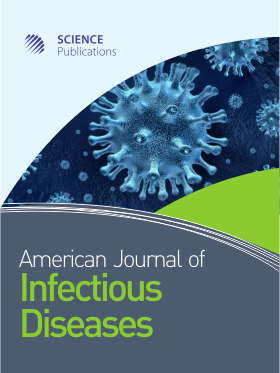Study on Survival of Chlamydia trachomatis in the Presence of Antichlamydial Drugs
- 1 National Institute of Pathology, India
Abstract
Problem statement: Recurrent genital Chlamydia trachomatis infections due to treatment failures may results in complex sequelae leading to reproductive complexity and morbidity. It can be resulted by the heterotypic resistance with decreased drug susceptibility characteristic of the isolate. Studies are needed to understand the treatment failures and resistance characteristic of C. trachomatis. Hence, in vitro study was conducted on C. trachomatis isolate in the presence of antichlamydial drugs. Approach: Our aim was to study ygeD gene in C. trachomatis clinical isolate having decreased drug susceptibility profile and to analyze HeLa cells phenotypically upon infection in presence of antichlamydial drugs. Sequencing was done to check any mutational change (s) in ygeD gene of C. trachomatis isolate (CT-244), mRNA expression was analyzed in presence of antichlamydial drugs by Real Time RT-PCR. Transduction study was carried out in infected HeLa cells to detect changes at cellular level in presence of antichlamydial drugs by transducing with GFP/RFP-tagged proteins and analyzed by FACS. Results: A point mutation was detected in ygeD gene of C. trachomatis isolate. Further, mRNA expression level of ygeD gene was observed to be increased at 8 hpi in presence of doxycycline while in presence of azithromycin it was increased at 24 hpi. GFP-tagged plasma membrane protein expression in infected HeLa cells found to be reduced as compare to the uninfected cells. Upon infection, the RFP-tagged actin protein expression was up-regulated in comparison to the uninfected HeLa cells. No difference in expression of plasma membrane and actin protein was observed in susceptible serovar D and CT-244 isolate. Conclusion: The present study suggest that C. trachomatis isolate with decreased drug susceptibility profile may have an active efflux strategy for its survival in the presence of antichlamydial drugs and it may not affect its host cell plasma membrane or actin organization for its survival in order to resist the antichlamydial drugs.
DOI: https://doi.org/10.3844/ajidsp.2012.5.12

- 4,176 Views
- 3,545 Downloads
- 0 Citations
Download
Keywords
- Chlamydia trachomatis
- recurrent infection
- antimicrobial susceptibility
- antichlamydial drugs
- pelvic inflammatory
- chlamydial infections
- decreased susceptibility
- protein expression
